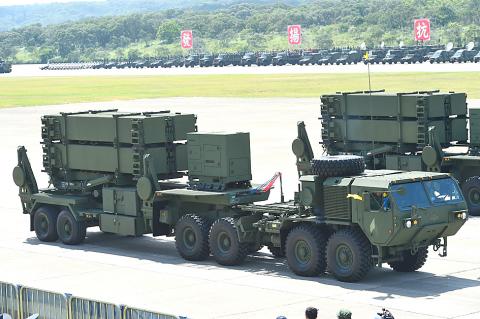A Taiwanese manufacturer has become part of the US-made MIM-104F (PAC-3) Patriot missile supply chain after passing appraisals from the weapon’s developer, sources said, adding that the company has received NT$800 million (US$25.3 million) in international orders.
“Although the PAC-3 missile is an American product, it has Taiwanese technology in its ‘DNA,’” said a high-ranking military official who declined to be named, adding that the local manufacturer has exceptionally good radar-tracking signal management technology that the US contractors wanted.
The radar signal management technology was developed at the Ministry of National Defense-affiliated National Chungshan Institute of Science and Technology and started out as a military product before being released for commercial use, the official said.

Photo: Chang Chia-ming, Taipei Times
The high-speed digital signal management software module was released to a large domestic software company, which then used it in domestic and international military equipment orders, the official said, adding that these orders included the PAC-3 after it passed appraisals by US-based companies Lockheed Martin and Raytheon.
The official said the high-speed software is essential to interception and defense capabilities, adding that the Taiwanese software not only received recognition from foreign firms, but is also used in the Tien Kung III (Sky Bow III) surface-to-air missile system.
Institute vice director Major General Chang Kuan-chun (張冠群) led the institute’s first delegation to an international aerospace exhibition in Japan from Wednesday last week through Saturday.
The delegation exhibited 34 domestically developed defense technology products, including the Tien Kung III, Hsiung Feng II and Hsiung Feng III anti-ship missiles, and medium and large-sized automated drone systems.
The institute said it aims to improve international recognition of Taiwanese defense technology and improve cooperation with international manufacturers in producing both civilian and military products.
The missile system’s technology can be combined with other weapons and communications systems according to customer requirements, the institute said, adding that Taiwanese manufacturers are able to make complete aerospace systems.
Taiwan, South Korea and Japan deploy PAC-3 missile defense systems, the official said, adding that the institute was approached about the design and capabilities of the technology many times over the course of the exhibition.

PREPAREDNESS: Given the difficulty of importing ammunition during wartime, the Ministry of National Defense said it would prioritize ‘coproduction’ partnerships A newly formed unit of the Marine Corps tasked with land-based security operations has recently replaced its aging, domestically produced rifles with more advanced, US-made M4A1 rifles, a source said yesterday. The unnamed source familiar with the matter said the First Security Battalion of the Marine Corps’ Air Defense and Base Guard Group has replaced its older T65K2 rifles, which have been in service since the late 1980s, with the newly received M4A1s. The source did not say exactly when the upgrade took place or how many M4A1s were issued to the battalion. The confirmation came after Chinese-language media reported

A Ministry of Foreign Affairs official yesterday said that a delegation that visited China for an APEC meeting did not receive any kind of treatment that downgraded Taiwan’s sovereignty. Department of International Organizations Director-General Jonathan Sun (孫儉元) said that he and a group of ministry officials visited Shenzhen, China, to attend the APEC Informal Senior Officials’ Meeting last month. The trip went “smoothly and safely” for all Taiwanese delegates, as the Chinese side arranged the trip in accordance with long-standing practices, Sun said at the ministry’s weekly briefing. The Taiwanese group did not encounter any political suppression, he said. Sun made the remarks when

The Taiwanese passport ranked 33rd in a global listing of passports by convenience this month, rising three places from last month’s ranking, but matching its position in January last year. The Henley Passport Index, an international ranking of passports by the number of designations its holder can travel to without a visa, showed that the Taiwan passport enables holders to travel to 139 countries and territories without a visa. Singapore’s passport was ranked the most powerful with visa-free access to 192 destinations out of 227, according to the index published on Tuesday by UK-based migration investment consultancy firm Henley and Partners. Japan’s and

BROAD AGREEMENT: The two are nearing a trade deal to reduce Taiwan’s tariff to 15% and a commitment for TSMC to build five more fabs, a ‘New York Times’ report said Taiwan and the US have reached a broad consensus on a trade deal, the Executive Yuan’s Office of Trade Negotiations said yesterday, after a report said that Washington is set to reduce Taiwan’s tariff rate to 15 percent. The New York Times on Monday reported that the two nations are nearing a trade deal to reduce Taiwan’s tariff rate to 15 percent and commit Taiwan Semiconductor Manufacturing Co (TSMC, 台積電) to building at least five more facilities in the US. “The agreement, which has been under negotiation for months, is being legally scrubbed and could be announced this month,” the paper said,